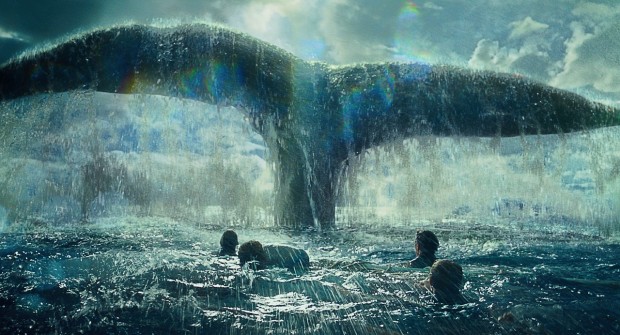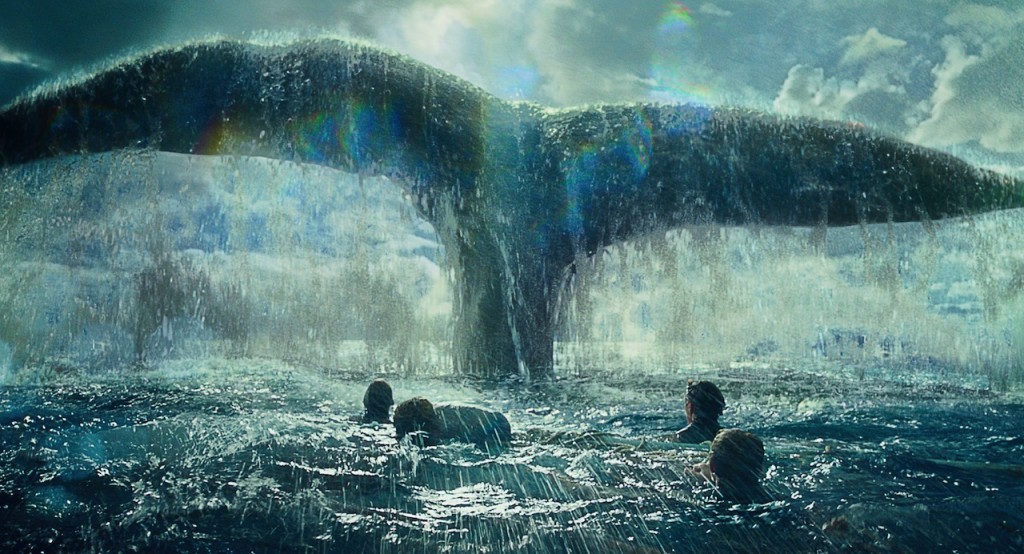Captain Ahab’s white whale is a metaphorical object for the ages. When it comes to In the Heart of the Sea, Ron Howard’s soggy nautical epic, an unconvincing take on the Moby Dick myth, the sea monster invites symbolic interpretations too tempting to ignore. Maybe Ahab’s desperate, pointless chase for the creature represents Howard’s search, now 23 features in, for a distinctive style or personality? Maybe the good ship Essex, our seafaring vessel for most of the two-hour run, is a stand-in for the movie, drifting through the endless blue, its maps and compasses pointing towards an ever-receding point or point of view? Or maybe the movie is the whale; a great, clumsy, ungraceful sea cow, floundering in the jetspray.
Heart of the Sea holds Herman Melville’s story at arm’s length, opting for a less ambitious arc of nautical disaster and survival while trying for prestige-by-association. It’s based on the right-life voyage of the Essex, captained by George Pollard, which set sail from Nantucket in the early 1800s at the height of the whale oil boom, and was sank by a hostile sperm whale some two thousand miles out from the South American coast. The survivors spent months at sea and resorted to cannibalism for survival, their ordeal recounted by First Mate Owen Chase and Thomas Nickerson, a 14 year old cabin boy, in printed works that would influence Melville’s Romantic masterpiece. Charles Leavitt’s leaky screenplay imagines a meeting between the hit-seeking novelist (Ben Whishaw) and an older, haunted Thomas (Brendan Glesson), and their night-long conversation about the fate of the Essex.
An immediate problem: the framing device upstages the core narrative. Their exchanges aren’t anything insightful, but they’re both solid performers, participating in a set-up that at least has a sliver of atmosphere to it; a rueful Gleeson sipping whiskey, staring into his roaring fireplace and dropping salty lines about ‘sailing to the edge of sanity’. I would happily watch 90 minutes of the lovely bearded Whishaw roaming around nineteenth-century port towns, scribbling his masterpiece and grumbling about how he’s not as good as Nathaniel Hawthorne. The reliance on a witness means we’re stuck with a blank cypher, the green-legs Thomas (played by Tom Holland, future web-slinger) who thinks whaling is pretty cool, and, well, that’s pretty much his character. Still, there’s not much character work to go around. Benjamin Walker is Captain Pollard, the inexperienced, unsure product of a whaling dynasty; his homestead is barely out of sight before he’s slapping his dick about. Chris Hemsworth is the second-in-command Chase, son of a disgraced farmer and expectant father, with a chip on his shoulder and a ridiculous Massachusetts twang. Cillian Murphy… is also there.
No-one was expecting Dick-level complexity in the writing, but everything that could be interesting is rendered dull and boilerplate: the class tension between the ship’s leader and deputy; the obsession their great white adversary provokes; the haggard desperation of the castaway crew; the moral squalor of cannibalism. The sense of physical and psychological damage, so crucial to a story like this, are lightly worn in a movie that goes for shortcuts. At one point we skip through a year-long lull, Gleeson’s voiceover speaking of the cabin fever weirdness overcoming the men, but there’s no detectable shift in the personalities at play. And an unsure Howard doesn’t know where to put his camera, jumping around from rushing trailer-friendly helicopter shots, to fisheye facials, to ground-level close-ups, without making such sense. The disaster scenes of cracking boughs and rogue anchors provide mild excitement but amongst all the jitteryness there’s little sustained tension.
This visual ambivalence is most underwhelming when it comes to the star of the show, the demonic whale whose myth is related to the crew by a shell-shocked Spanish seaman with one arm, one panto shade away from a hook hand. The gleaming monster – which, sure, is just a giant sperm whale, but still – should be the moneyshot but its impact is lost in boring computer-generated surf, all-important perspective and physicality dulled by studio sheen. Perched over at the ship’s brow, shot from a low-angle tilt with his sea-salt locks and bellowing about Poseidon, Hemsworth resembles the cover hero of a saucy period paperback. Something about blowholes, harpoons and docking in ports perhaps. The real hero of all this is Whishaw’s author-confessor, who manages to spin this aimless narrative into gold. Bravo, Mr. Melville; you’re a genius after all. Conor Smyth
In the Heart of the Sea is on general release from Boxing Day.







